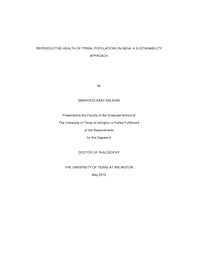
ATTENTION: The works hosted here are being migrated to a new repository that will consolidate resources, improve discoverability, and better show UTA's research impact on the global community. We will update authors as the migration progresses. Please see MavMatrix for more information.
Show simple item record
| dc.contributor.author | Salehin, Mashooq Azad | en_US |
| dc.date.accessioned | 2012-07-25T19:10:02Z | |
| dc.date.available | 2012-07-25T19:10:02Z | |
| dc.date.issued | 2012-07-25 | |
| dc.date.submitted | January 2012 | en_US |
| dc.identifier.other | DISS-11598 | en_US |
| dc.identifier.uri | http://hdl.handle.net/10106/11108 | |
| dc.description.abstract | In the context of global climate change, the sustainability approach takes a holistic view of development through preservation of nature during the course of socioeconomic and human development. Reproductive health functions as an integral component of human development, enabling `continuity' of human species through successful `reproductive processes'. Prior studies on reproductive health are restricted to determinants such as fertility, family size, and infant mortality with limited focus on developing a holistic or comprehensive explanation of reproductive health. Although social and economic factors have been identified as reproductive health factor in prior studies, ecological component has been overlooked historically in understanding reproductive health. The present study takes a sustainability approach to reproductive health and examines its relationship with socioeconomic and ecological correlates.Theoretical model of the present study is built on the concept of sustainability, ecosystem perspective, and Sen's (1992) `capability approach to health' which explain the aggregate effects of economic, social, and ecological factors on the reproductive health of tribal populations in India. The proposed framework suggests that the state of reproductive health reflects the aggregate effect of economic and social opportunities and ecological resources available for tribal women mediated through their level of power. Against the backdrop of environmental deterioration, this study focuses on the extent to which the changes in tribal habitat influence tribal women's power and reproductive health of tribal women. The data are from the National Family Health Survey (NFHS) conducted in 2005-06. Structural equation analysis is used to analyze the data. It is found that social and ecological factors are more influential than economic and power factor in determining tribal women's reproductive health outcomes. Overall, the results of the study partially support the proposed model. Implications for social work practice, policy, and research are discussed. The model proposed in this study can be utilized in understanding the reproductive health experiences of marginal populations in developing nations. | en_US |
| dc.description.sponsorship | Pillai, Vijayan K. | en_US |
| dc.language.iso | en | en_US |
| dc.publisher | Social Work | en_US |
| dc.title | Reproductive Health Of Tribal Populations In India: A Sustainability Approach | en_US |
| dc.type | Ph.D. | en_US |
| dc.contributor.committeeChair | Pillai, Vijayan K. | en_US |
| dc.degree.department | Social Work | en_US |
| dc.degree.discipline | Social Work | en_US |
| dc.degree.grantor | University of Texas at Arlington | en_US |
| dc.degree.level | doctoral | en_US |
| dc.degree.name | Ph.D. | en_US |
Files in this item
- Name:
- SALEHIN_uta_2502D_11598.pdf
- Size:
- 712.6Kb
- Format:
- PDF
This item appears in the following Collection(s)
Show simple item record


